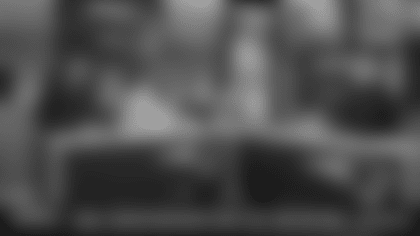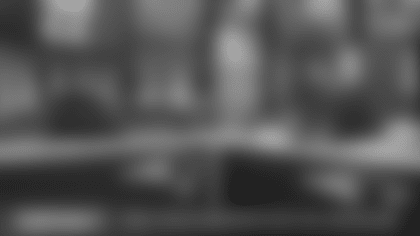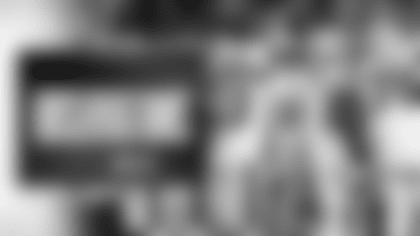HEAD COACH BILL BELICHICK
CONFERENCE CALL
January 22, 2019
Q: What stands out to you about the challenge of blocking the Rams defensive line from a pass-rush standpoint?
BB: Yeah, they're really good. They've got great inside power and quickness and they've got a great edge rush. They've got a lot of good players, a lot of guys that are hard to block. Yeah, they're good. They do a really good job. Wade [Phillips] always does. He's an excellent coach and he does such a great job with all of those guys there. They have a variety of players and they're all a problem.
Q: What stands out specifically about Aaron Donald and his style of play?
BB: Everything. He's pretty much unblockable.
Q: How rare has it been to turn on the tape and see him single blocked? Is he pretty much doubled on every play?
BB: Well, I mean, you've got to block the other guys. You can't just have guys running free into the backfield. There's plenty of times that you could single block him.
Q: What did you see on film that made your offense so efficient on third down versus Kansas City?
BB: Really, it just came down to some great execution. We had some long-yardage situations that we converted. Missed some short-yardage situations, but overall, the ones that we needed to make at the end, fortunately we made. We had good protection and the offensive line did a good job. Tom [Brady] threw the ball well. We made some tough catches, but just team execution. It's not any one guy. We needed everybody doing it.
Q: Is there a message for the team going into a game against a defense like the Rams that obviously you want to try and stay out of the third-and-longs?
BB: Right. Well, we always want to stay away from third-and-long. It's never a situation that we want to be in but we'd like to be prepared for it. It's obviously going to come up at some point. We're not trying to be in that position.
Q: What have you seen from the offensive line from a chemistry standpoint as a whole?
BB: There's a lot of unselfish, hard-working guys in that group. You see that every week when they compete.
Q: What about their ability to adapt weekly? Are their fundamentals the same each week, but given each opponent are they asked to maybe do some things differently?
BB: Yeah, absolutely. Every week's different. Every week's a new challenge with different players and different schemes. That's the way it is in the National Football League. Every team's got good players, good coaches, work hard and try to make it hard on you. It's very competitive. Those guys have their hands full every week. They come to work every day and continue to work hard to get better and they've done that over the course of the year, both individually and collectively as a unit.
Q: How do they go about operating as a unit when it comes to making suggestions or voicing their input on something, or do they just take the coaching from Dante Scarnecchia as it is?
BB: Well, of course all of the players try to execute the plays the way that they've been presented. But there's always an element of adjusting or having to modify your technique or the way you're doing it based on a certain look or the way the player plays the play and how it unfolds after the snap. We have a pretty experienced group there. Certainly the input that we get from them – I mean, look, they want to block the guy. We want to block the guy. If they feel like they can do something a certain way and it might be a little different from the way we've talked about, we'll take that into consideration and a lot of times go with what they think because, look, they want the same thing that we do. As long as it's sound and it fits with everything else that we're doing.
Q: Do you have any reaction to the reports of a laser pointer being flashed in Tom Brady's face during last Sunday's game?
BB: Yeah, right now we're really focused on getting ready for the Rams, so that's what I'm working on.
Q: Did it affect any of the plays at all?
BB: We're working on the Rams.
Q: You're going up against the youngest coach in the league in Sean McVay. A lot of people think you may have an advantage in that regard. What are your thoughts about facing someone like him?
BB: I have a ton of respect for Sean. I think he's done a great job in the two years he's been with the Rams. His teams have performed at an extremely high level. They're very consistent. They're well-coached. He has a great scheme. The players execute it on a consistent basis at a very high level. He's got a great coaching staff. Offense, defense, special teams – they're good in every area. Coach [John] Fassel, Coach [Wade] Phillips, a great staff. Coach [Jedd] Fisch I know is also an important part of that staff. The coaching, the playing, the consistency – Coach McVay's done a tremendous job out there. He's got a great team. They'll be very hard to beat, but we're going to compete against them and do the best that we can to be ready to go a week from Sunday. I think he's done an outstanding job. I have a ton of respect for the way his team has played and how well they play and what he's accomplished out there, and in his entire career, but as a head coach in the last two years.
Q: Is there any symbolic significance to facing the Rams now here in 2019 given that they were the first opponent back when your run of success began here in 2002 in Super Bowl XXXVI?
BB: Yeah, I'm not really worried about what happened five, 10, 20 years ago. I'm trying to get ready for this team. There's not, I don't think, a lot of relevance in any of those games.
Q: Is the offense they run in Los Angeles similar to the styles of offense that Sean McVay learned alongside coaches like Kyle Shanahan?
BB: Yeah, that's probably a good question to ask Sean. I'm not exactly sure what all of the influences are and so forth. I mean, I know where he's worked also but I think that's really a better question for him than me. I know what they do and they do it very well. They do a lot of things. They're a very difficult offense to stop. How much is it like some other offense or not? I mean, I don't know.
Q: They use similar personnel on most of their offensive plays and don't do a ton of substituting. What makes them so efficient even though they're not switching things up too much?
BB: Well, they switch things up a lot. They just do it with the same players. That's what makes them so good is everybody can do everything.
Q: Play-action seems to be a big part of their offense as well.
BB: Yeah, they're very good at that but, again, they're good at everything. They're good at running the ball. They're good at play-actions. They're good at screens. They're good on the deep ball. They're good on the catch-and-run plays. They're good at everything.
Q: When you went to the Washington Redskins for the joint practices back in 2014, did you meet Sean McVay then?
BB: No, we didn't spend much time together; no.
Q: Did you come to know him a little bit after executing the trade of Brandin Cooks to the Rams last off-season?
BB: Yeah, I know him.
Q: According to statistics, Super Bowl teams typically turnover about a third of their roster the next season. Do you think that's just the nature of the business with the salary cap?
BB: So what does this have to do with the game now?
Q: Given that you've had to make some of these tough decisions with your roster over the years regarding players that had important roles on teams that reached the Super Bowl, I'm curious how tough it is to make those decisions when you've just had success with that group of players the year before?
BB: I mean, look, there's a lot of turnover in the National Football League on every team in every year. It's the National Football League. Teams turnover a lot of players and a lot of coaches every single year, every single team.
Q: In a loud environment, but also in general, is it important to have a center who's snaps are very consistent and just every time he does it, Tom Brady knows what to expect? Is that something that David Andrews is particularly good at?
BB: Yeah, the answer to all of those questions is yes. Good communication between the center and the quarterback is critical. The confidence that the quarterback has in the center and the exchange and the cadence and everything is a huge advantage in terms of the execution of the play. You can't take it for granted that when you're thinking about that, then you're not thinking about other things that are pertinent to the play. It just sets you behind in the play and it leads to more problems. It just kind of snowballs and into making everything a little bit more difficult. David's very good at not only that with the quarterback, but also because he's in the center of the line and can communicate with both sides of the line, he sets the table in terms of line calls and how the other four linemen, five in total, are blocking different fronts and different looks, and then of course after the ball is snapped that can all change in a hurry. Again, when you're in the middle of it you're involved in almost everything – communication with the quarterback, communication with the teammates, execution of blocking patterns, run or pass, before and after the snap. All of that really falls onto the centers job description and the ability to handle those situations very quickly, very decisively and still handle the ball cleanly because, as we know, there's nothing more important than possession of the football. To do all of those things right and then to have a bad snap and to have turnovers because of the quarterback-center exchange undoes – a million good things are undone with one mistake in the ball-handling. Yeah, it's a critical position and it's critical to the functionality of the entire unit.
Q: Is that something you saw from David in college?
BB: Yeah, well David's a good center. He's played center his whole life. He played center in junior high, he played center in high school, he played center in college and he's playing center here. I would say he's very comfortable with all of the things that come with that position. I can't imagine there's anything that he sees at this point in his career that he hasn't already seen multiple times, if not hundreds of times, in one way or another. He's very experienced and he's very adept at handling variations of all of the things that I just mentioned. He's a lifetime – he's a career center and he plays like it.
Q: Is maturity and the ability to not get distracted by the hoopla of the Super Bowl a strength that you have seen featured in your players?
BB: Every player is different. Every team is different. As one of the questions was earlier asked about the makeup of the team, there are new players and usually new coaches, I would say, but certainly new players on every single team in the league every year. The chemistry and the interaction and communication between all of the people, players, coaches and other support people involved is different from year to year. A foundation has to be laid and it has to be accomplished ever year, every season. Yeah, maturity and decision making and accountability and dependability, of course all of those things are important. But they all have to be, I'd say they all have to be done every year hundreds and hundreds of times over and over again. It doesn't matter whether you've done them before or whether you've never done them before. It really doesn't matter because if you've done it before you have to do it again, and if you haven't done it before you have to prove that you can do it and then you have to repeatedly do it consistently and repeatedly over a sustained period of time. We're all faced with that challenge every day and every week and certainly in this game it'll be a big challenge because the Rams – they're a tough, disciplined, hard-nosed football team and it'll take our best to compete with them.
OFFENSIVE COORDINATOR JOSH MCDANIELS
CONFERENCE CALL
January 22, 2019
Q: Tom Brady said on the radio yesterday that Dante Scarnecchia has to be the best offensive line coach in the history of the NFL. For someone that works as closely as you do with him, what makes Dante such a highly regarded offensive line coach?
JM: Scar is an extremely hard worker. I don't think anybody works harder than him and we have a lot of guys that work hard here. He is incredibly well-prepared and detailed in his preparation for the opponent and in terms of his preparation for the players that he's responsible for coaching on a daily basis. He's extremely thorough. He's a great communicator and a great teacher of the fundamental aspects of the game of football. Any player would tell you that in order to be good in this league, you're going to have to be good fundamentally and technically and nobody's a better teacher that I've worked with on that stuff than Dante. He's a great part of our staff. He's helpful in every way to all the assistant coaches that work with him and he's a competitive guy that wants to do well in every area that he's responsible for and does anything and everything he can to help us win. I can't say enough about the type of person he is, the type of coach he is, what he's meant to me and the other guys on our staff and me personally throughout my entire career because I was young when I came over here on the offensive side and I've learned more from Dante than I can possibly describe. He's just a great teacher, great person, great, great football coach.
Q: In a game like the Super Bowl where you know your opponent and have two weeks to prepare, when you're going over details, how important is it to go over as many details as possible with what the Rams defense is going to throw at you? How helpful is it to have a guy like Tom Brady who's been through this so often to process and prioritize those details?
JM: I think that's one of the challenges of this preparation, is to be well-prepared but not overdo it. There's really only one other situation that you can compare this week to and that's even a stretch to say that, and that's the first game of the year where you have so much time to prepare for the opponent because you're not really sure what they're going to do. This one, same thing, you've got a lot of time to prepare for them but you've got to be careful because you start getting into over-coaching and too much information and you overload the players. Now we're not playing fast and aggressive, we're thinking and trying to do too many things that are out of character or not in our nature. I think you want to try to strike the right balance with them like you do every week. You just have more time so you've just got to distribute it properly, make sure you don't overdo too many things in one area so that they know what to do and can go out and do it properly, the way that you'd like them to. That's really the goal. Obviously, Tom has experience in this situation. We have a lot of players that have experience in this situation as well, so that doesn't really much matter this week. What matters is how well we prepare this week for this opponent who's the best team we've played all year – what we're able to do in 12 days out there on the field in terms of performance. That's what we're going to strive for and hopefully we have a great two weeks of preparation and go out and play our best game of the year.
Q: You converted a trio of third-and-10s in overtime on Sunday. What did you see when you looked on the film of why you were successful on those challenging plays?
JM: That's not a situation you really want to be in a whole lot. Statistically, it's a very low percentage you're going to convert those in our league, so normally when we're in those situations, we didn't do too well in the first two plays of the series or the sequence at least. So we want to try to stay away from it as much as possible but we did have a few of those come up the other night and the guys did a tremendous job of executing. When you have to get 10 yards or more on one play and the defense knows it, it's a challenging situation because they can do whatever they want to try to stop you or disrupt you and you can't afford to throw the ball short or throw the ball away or take a check-down and gain four yards. It's not like a first or second down play where you have another down to try to make it. So I think it just comes down to in those situations, you've got to call something that you feel comfortable with and you know that our guys know how to execute well and then trust your guys to go out there and do it. They deserve all the credit in the world, they went out there under pressure and made some huge plays in those situations. I think it started with our pass protection. The offensive line, the tight ends and the backs did a really good job of really securing the pocket and giving us some time to survey the field in those situations because if you need to convert on a third-and-long, you're going to have to hold the ball just a little bit. They did a good job of that and then the guys ran routes to win and in all three cases, we had to make tight throws and tight catches. Those plays always come down to player execution and I thought our guys did a really good job under pressure in those situations.
Q: How valuable has Sony Michel been to you this year? What has Sony brought to you that you didn't have?
JM: We've always had kind of diverse backs here going back many years. We've had guys that do different things well. But we've always also tried to have guys that can impact the game not only in the running game but in the passing game and in protections and in many cases, contribute in some way on special teams. I think Sony's a young guy. He's got a good run style that's really allowed us to be a physical football team and he's a very, very willing participant in blitz pickup. He's a smart guy. He understands what his assignments are, what his rules are when we put him in those situations. He can play in the passing game – we don't have him do that too many times because the other guys do a good job in their roles as well. He's a competitive kid, he practices hard, football is important to him and he's been able to add another element to our room in terms of his toughness and his play style that we really enjoy. He's got tremendous mentors in his room that he's learned from. I would be lying to you if I told you that Sony wasn't a better player now than he was when he first got here and a lot of that has to do with Ivan Fears and the room that he's in. He's really taken note of that and become a much better football player as the year has progressed, which is what you hope for with all rookies.
Q: Sony didn't have a game with more than 20 carries when he was at Georgia and it seemed like in preseason, Jeremy Hill looked good enough to be that running back taking on the big workload. Has Sony opened your eyes in his ability to take on a workload like he has?
JM: I don't think we ever predetermine what the roles of the backs are going to be. I think what Sony's done is he's taken advantage of some of the opportunities that he's had and he's certainly done the best he can do with those opportunities. I don't think we went into the season saying that this was going to be the way that it was going to be and as you saw the other night, Rex [Burkhead] ended up in there a few times down on the goal line, as did Sony. So we would like to have our backs be in many ways, interchangeable and we all know that they have maybe a slightly different role. But they're in the same room, they're in the same meetings, they're learning the same information and they're responsible to go out there and be able to perform in those roles if somebody were to be injured or hurt or not active for whatever reason. I think that Sony's role has just kind of developed as the year's gone on. He missed some time earlier in the year and he's just continued to work and develop as the season's gone on. Again, I think he's just like the rest of our group – whatever his role is on a given week, he embraces what it is and studies and prepares to do the best he can on game day and then goes out and gives us everything he has. I think that's all you can ever ask of any player and he's certainly a good example of that for a young guy.
Q: Was Rex Burkhead out there in those goal line situations at the end of the game because of his versatility and the things he could do or was that related to the number of carries Sony Michel had already had?
JM: No, like I said, we went into the game planning on playing multiple guys and most of the time, we played all three on the same drive at some point. There were a couple of instances where that wasn't the case but nothing in particular.
DEFENSIVE LINE COACH BRENDAN DALY
CONFERENCE CALL
January 22, 2019
Q: What is your opinion of the job Sean McVay has done with this Rams offense? What common traits do you see from the scheme and the style this group brings?
BD: Well, I would say they've done a fantastic job. It's an offense that's very balanced, they're versatile, they're good at a number of different things, they present a lot of problems, both with their personnel and with their scheme. It's been interesting to see them adapt and evolve over the course of the season. They've had a couple injury situations that they've dealt with in Cooper Kupp and [Todd] Gurley being out that they've handled somewhat seamlessly, it appears. I think they've done a great job. Aaron Kromer with the offensive line – they've got a very good group up there that plays very well together. Those guys have started every game for them. So, they're explosive, they're able to score points, they're able to play the game a number of different ways and they've been extremely effective.
Q: How would you describe what makes Trey Flowers an effective player? What traits does he have that allow him to perform at such a high level?
BD: The first thing that comes to mind is he has a phenomenal work ethic. But, beyond that, he's smart, he's instinctive, he plays with great fundamentals and technique. I would say those three things have all improved based on his work ethic and the time that he puts in. He does a great job and he is an unselfish player, he's willing to do whatever you ask him to do, even if it may not be best for him, he understands the big picture and he understands what he needs to do to help the team win and he's always been willing to do that.
Q: Does he remind you of anyone else you've coached in the past?
BD: Well, I've thought this for a long time, and it's a name that you may not recognize, but I had a guy by the name of James Hall who was with the Rams, ironically, when I was there, who had a lot of similarities in terms of play style, in terms of his versatility, in terms of his football IQ and his technique. He reminds me a little bit of Trey.
Q: How different is the Rams offense now that they have two running backs that they can switch in and out with C.J. Anderson in the mix?
BD: Yeah, that's obviously been a nice addition for their team. You know, every game is different. The Kansas City game was different challenges to prepare for than the Chargers game. So, week to week, that's pretty common. I would say this team presents its own unique challenges. The running game is definitely something that they're very good at and they've been able to effectively run the football pretty consistently over the course of the year, and then they've got explosive play makers at the skill positions where they've generated some big plays, and most importantly they've been able to move the ball and get the ball in the end zone, however they need to do it – play-action passes, screens, explosive passes, moving the chains with short passing game and the running game. So, they do an excellent job. This game plan, like every other game plan, you start at the drawing board each week and you get to know the personnel and you try to figure out how they use their personnel and how they may attack you and how do you best defend that.
Q: Is there any advantage having played them two years ago?
BD: That game was 2016. I'd say it's a different coaching staff, different program. I don't see a whole lot of correlation between that game and the one we're about to play, to be honest with you.
Q: What is your impression on how you guys have been able to improve as a defensive front, especially in generating pressure while understanding the fine line of keeping gap responsibilities?
BD: Yeah, that's a constant balance, which I'd say this – we've got some good players up there. We've got some guys that are very smart, that make adjustments extremely well. I would say one of the best things that we've done over the past several weeks – I've been impressed with our communication and those guys' ability to communicate with each other, get everyone on the same page in some very critical and difficult situations and be effective and productive as they're all in the same coordinated call. So, I think it's a group of guys up there that has all performed well together. We're going to have to continue to do that. We're going to have to walk that fine line again this week in terms of dealing with Jared Goff and his movement in the pocket and also they do a great job in terms of their protections, particularly in some of their play-action stuff, and give you some challenging looks where it's difficult to rush against, to be quite honest.
Q: Andrew Whitworth is one of their most impressive offensive linemen and he's been around the NFL. What has impressed you over the years about him?
BD: Well, I would say what's been impressive watching him over the course of his career is his ability to move from left guard for the majority of his time in Cincinnati, which he played at an extremely high level, and then move outside to play at tackle for as long as he has at this point and still at an extremely high level – whatever he is, 13 years in or whatever he's got. There's not a whole lot of guys that make that move. There's a few that you see that go from tackle to guard. [Rodger] Saffold, their left guard, is one of those guys who went from outside early in his career to inside. I don't know that you see quite so often a guy that starts his career at guard for a significant period of time – not just waiting on somebody else to move on – but he performed in there at a high level for quite a while and has moved outside and been equally as good for an extended period of time.
Q: How did you think you guys played in the critical situations Sunday when it got kind of harried in that fourth quarter? What kind of learning experience did you gain from that fourth quarter in an AFC Championship game and how might you apply it in a Super Bowl?
BD: Well, I would say there were some very critical moments there in the fourth quarter, and really throughout the game, to be honest with you. It was the type of game that I think we expected in terms of it being a 60-plus minute game and coming down to situational football and playing well in the critical moments. I'd say that that's what we've worked all year for and that's what we practice for. It was great to see our guys respond and not have any issue dealing with that adversity. I felt like the focus and the energy on the sideline all the way through the thing was very lasered-in. I thought the guys embraced the challenge, to be honest. We'll see. There's obviously going to be similar challenges that we're going to face in this next game, and that's just part of it. That's week-in and week-out in this league. Particularly at this time of the year, that's the way games are going to be.
Q: What stands out to you about the Rams offensive line's styles of play and how that will challenge you guys?
BD: Well, I would say as a group, they're a good unit. They do a very good job in terms of the scheme that coach Kromer runs and Coach McVay. They do a great job of utilizing the movement of the defenders and displacing them to create some running lanes. You've got to play with really good technique and really good hand placement and pad level against this group, in the run game specifically. They work very well together on their combination blocks, and I would say their communication looks like it's very good. John Sullivan, the center, I was with at Minnesota years ago – extremely bright, sharp guy, understands the game, has really good quickness and athleticism. I think he's done a great job for them. And then Saffold, the left guard, I would say is an explosive player, got good athleticism, does a great job as a puller. So, they've got a couple of good pieces over there next to Whitworth, who we already kind of talked about for a while. Over on the right side, [Rob] Havenstein is a big, long, powerful guy. He's tough to get around, he's got great size, does a good job of shielding blockers in the run game, so he's an issue. And then the guy that's come in there this year for them, Austin Blythe, at the right guard spot is actually really impressive – you know, younger guy who hasn't played a whole lot, but I'll tell you, he's tenacious, he fights, he's got a little bit of craftiness and savviness for a guy who hasn't played very long, does a great job with angles and finishes blocks really well. As you watch them a little bit, it's no surprise to correlate their production from what they've had all season, both run and pass, with this group. They've got a really good group up front.

































